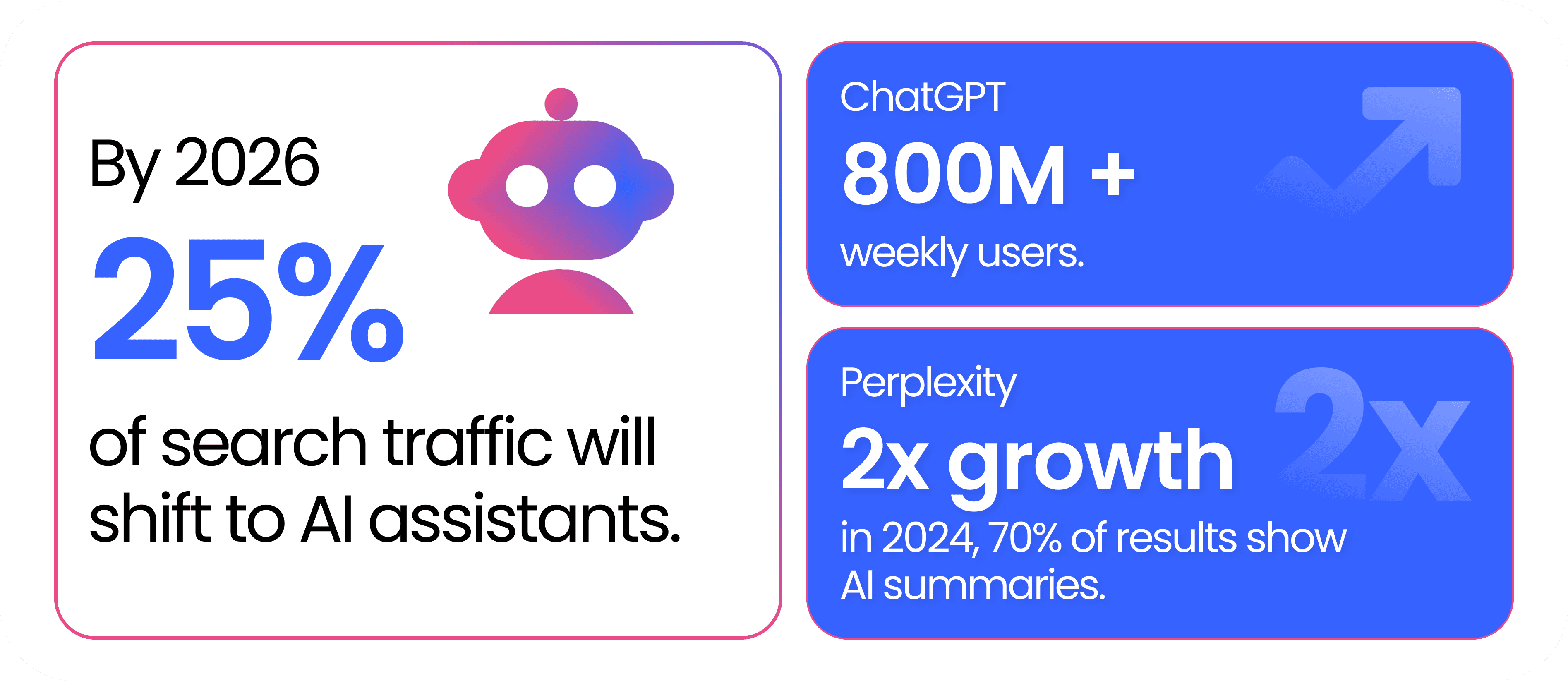What is GEO? The Guide to Generative Engine Optimization
Discover why optimizing for AI answers is now key to your brand’s visibility.
Dominyka Binkauskaitė, Project Manager
For more than two decades, digital visibility was defined by three letters: SEO.
Businesses optimized websites to rank higher on Google, chased backlinks, analyzed keywords, and tracked every algorithm update. If you landed on page one, you won. If not - your content was basically invisible.
But the way people search online is changing. In 2025, millions of users no longer start with Google. They turn to AI tools like ChatGPT, Perplexity, Gemini, Copilot, Grok, and Claude.

Instead of scrolling through ten blue links, they simply ask a question and get an instant answer. That shift brings a new challenge: how do you make sure your brand actually shows up in those answers?
The solution is called GEO - Generative Engine Optimization.
Executive Summary
Generative Engine Optimization (GEO) is the practice of shaping your content so AI-driven engines like ChatGPT, Perplexity, Gemini, Copilot, Grok, and Claude can easily find, understand, and reuse it directly in their answers. As search behavior shifts from clicking blue links to receiving synthesized AI responses, brands must optimize not just for rankings, but for being cited as a trusted source inside those answers.
Unlike traditional SEO, which targets click‑throughs from SERPs, GEO focuses on clarity, credibility, and reusable structures (like FAQs and short, direct explanations) that large language models can safely quote or summarize. Early adopters who adapt their content to answer specific, conversational questions stand to capture visibility and trust as AI assistants increasingly become the default starting point for information search. Contact Linkedist if you want to become visible by AI Models right now.
So, what is GEO?
GEO is the process of making sure your business and your content appear in AI-generated answers.
If SEO is about climbing to the top of Google’s results, GEO is about becoming part of the response itself.
Think of it like this:
In SEO, someone types “best project management software 2025” and gets a list of websites. You cross your fingers your page ranks high enough to earn a click. 🤞
In GEO, someone asks ChatGPT or Perplexity: “What’s the best project management tool for remote teams?” and the AI chatbot provides a short, direct answer. If your content is clear, relevant, and trusted, AI may use your page as part of that answer.
That’s the magic of GEO: not being a link among many, but being the source behind the answer.
Why GEO matters:
Search behavior is shifting at record speed:
📊 Gartner predicts that by 2026, 25% of traditional search traffic will disappear, replaced by AI assistants.
🤖 ChatGPT has over 800 million weekly users, many of whom use it daily to gather information.
📈 Perplexity grew 12 times in 2024, and over 70% of its results show AI-generated summaries before displaying any links.

This means that if your business is not part of these AI answers, you risk losing visibility - no matter how strong your traditional SEO is.
As Catherine Kurt, CEO of Linkedist, put it:
“In a year, we’ll use AI models to search for everything: not just with text, but with voice as well. Businesses that are not found through AI will lose 50% or more of their organic traffic in the long run.”
GEO vs SEO: spot the difference
Sure, both deal with visibility. But the rules? Completely different.
SEO relies on ranking factors: keywords, backlinks, and site performance. It asks: “How do I rank higher on Google?”
GEO relies on clarity, credibility, and reusability. It asks: “How do I make sure ChatGPT, Perplexity, or Gemini cite me in the answer itself?”
The difference sounds subtle, but it flips the entire game.
How GEO works in practice:
AI tools don’t read the internet the way people do. They scan content for signals that show clarity and trustworthiness. For example:
Clear structure. FAQs, question-and-answer formats, and straightforward explanations make it easier for AI to pull from you.
Credibility. Appearing in trusted databases, positive reviews, or sharing original data boosts your chances.
Simplicity. Short, direct statements are easier for AI to reuse than long, complex paragraphs.
Let’s bring back our SaaS example: a potential customer asks ChatGPT, “What’s the best project management tool for startups?” If your site has a well-structured FAQ or a clear comparison page answering that exact question, AI is much more likely to pull your content into its response – even if the user wasn’t directly searching for your brand.
Why this matters for businesses and marketers:
For brands, GEO is a strategic decision.
It changes how we think about content: instead of writing only to rank, we must also write to answer.
It changes how we think about trust: credibility now depends on backlinks and on how AI interprets your authority.
It changes how we think about visibility: success is not measured only in clicks, but in whether your brand becomes part of the AI-driven narrative.
In short: GEO won’t kill SEO, but it’s quickly becoming just as important – maybe even more.

Linkedist and GEO
At Linkedist, we’re already helping businesses optimize their content for GEO. We understand the intricacies of AI-driven search and can help position your brand as a source of trusted, reusable information in the age of AI.
Final thought
SEO helped businesses get found. GEO will decide which businesses get remembered.
🚀The shift has already started and the earlier you adapt, the stronger your visibility will be in the AI-driven digital world.
As Catherine Kurt, CEO of Linkedist, summed it up perfectly:
“GEO is the new gold mine for businesses that aren’t the biggest players. It’s a chance to stand out while competitors still don’t see what’s coming.”

